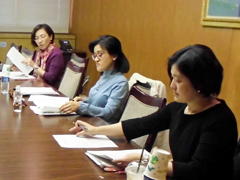Searching for the Key to Help-seeking for Gender-based Violence Victims
2018.06.13
On May 11, 2018, the 2nd Authors' Workshop on the JICA Research Institute (JICA-RI) research project "Conflict and Gender Based Violence: The role of aid in help-seeking and recovery process for victims" was held in Tokyo. Chigumi Kawaguchi, JICA-RI research fellow, Yuko Tobinai, associate professor at Morioka University, and Miho Fukui from Association for Aid and Relief, Japan (AAR Japan) each gave reports on the progress of their research. They then exchanged opinions with Ako Muto, JICA-RI senior research fellow, and Masako Tanaka, professor at Sophia University, who participated as an advisor.

From left, Chigumi Kawaguchi, JICA-RI research fellow, Masako Tanaka, professor at Sophia University and Miho Fukui from AAR Japan
Gender-based violence (GBV) is more apt to occur under the influence of conflict. Not only does it do significant physical and emotional damage to the victim, but it is also a problem with high psychological and social barriers for victims/survivors who want to tell others and seek their help. The research project, which began in April 2017, focuses not on the reality of GBV experiences, but rather on whom, when and how the victim asks for help, or why they do not. The project's aim is to clarify what support is needed by GBV victims/survivors. Researchers have been conducting interview surveys of refugees from South Sudan who have flowed into Uganda in large numbers, regarding their awareness of the expression "GBV" and related matters. Concrete improvement measures are now being explored.
At this Authors' Workshop, first, Kawaguchi reported on the progress of local investigations conducted in Feb. 2018. She then gave an overview of the working paper she is writing in light of the findings. The study involved refugees from South Sudan living in six areas: four districts in Uganda's West Nile Region, Kiryadongo and Kampala. Focus group discussions (FDGs) were held a total of twelve times, once each for the male group and the female group in each area. Combined with individual interview surveys, a total of 241 people (115 men, 126 women) participated in the study. Feedback meetings will soon be held with stakeholders in the areas. Based on the study's findings, Kawaguchi explained that people's awareness of GBV is not limited to sexual violence, but also includes domestic violence (DV) and intimate-partner violence (IPV). In addition, she explained that the most common determining factor in whether a GBV victims/survivor seeks help was the decision of family closest to the victim, and the refugee community, including opinion leaders and churches.
Next, Tobinai gave a presentation from a cultural anthropological perspective on observations from the investigation conducted in the Mongola settlement in Adjumani, regarding the views of refugees toward gender and their awareness of GBV. She reported that, although people recognize GBV as a problem, they believe it is a problem that should be solved in the family or the community, and do not use outside assistance for GBV victims/survivors even if they know it is available.
In 2000, United Nations Security Resolution 1325 (Women, Peace and Security) was passed by the UN Security Council as action by the international community regarding GBV. The resolution addresses the unfairly high impact of conflict on females, and indicates the need for special measures to protect women and girls from all violence, including GBV. Fukui gave a report on the degree to which the resolution's international standards are being applied in refugee camps in Moyo, and ways in which the GBV victims/survivors support system can be improved, in light of the findings of the interview survey.
The research findings will be published in FY2018 as three working papers, also taking into account the findings of the May 2018 field research in Uganda.

事業事前評価表(地球規模課題対応国際科学技術協力(SATREPS)).国際協力機構 地球環境部 . 防災第一チーム. 1.案件名.国 名: フィリピン共和国.

事業事前評価表(地球規模課題対応国際科学技術協力(SATREPS)).国際協力機構 地球環境部 . 防災第一チーム. 1.案件名.国 名: フィリピン共和国.

事業事前評価表(地球規模課題対応国際科学技術協力(SATREPS)).国際協力機構 地球環境部 . 防災第一チーム. 1.案件名.国 名: フィリピン共和国.

事業事前評価表(地球規模課題対応国際科学技術協力(SATREPS)).国際協力機構 地球環境部 . 防災第一チーム. 1.案件名.国 名: フィリピン共和国.

事業事前評価表(地球規模課題対応国際科学技術協力(SATREPS)).国際協力機構 地球環境部 . 防災第一チーム. 1.案件名.国 名: フィリピン共和国.
scroll